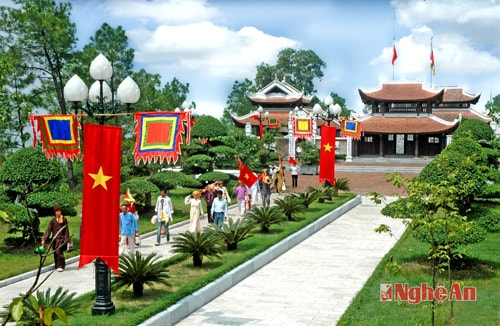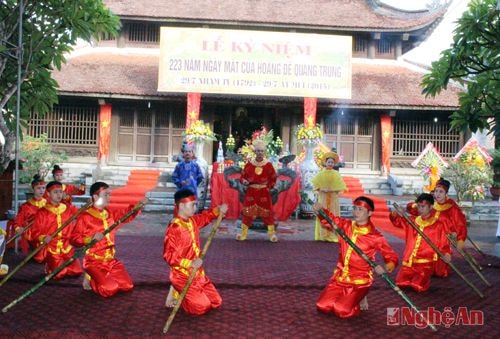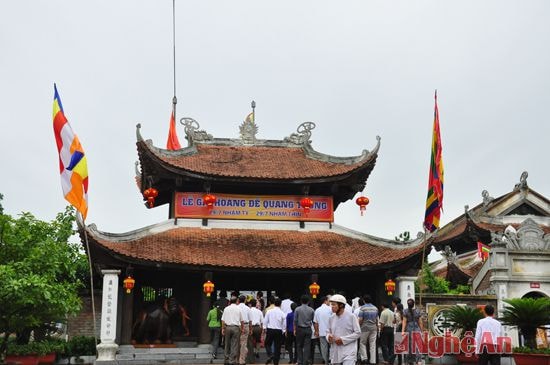Quang Trung Nguyen Hue: A talented general
(Baonghean)- Quang Trung Nguyen Hue, the outstanding Emperor, a great national hero and a talented general who won every battle with many glorious martial arts achievements, was praised by many scholars and newspapers. King Quang Trung passed away at the age of 39, leaving behind much grief for the people.
In a village named Phu Lac (in Binh An commune, Tay Son district, Binh Dinh province today), there was a family named Nguyen with three sons named: Nguyen Nhac, Nguyen Lu, Nguyen Hue. Nguyen Hue was born in 1752 - although he was the youngest, he was tall and always willing to help his family, his brothers did many things. Nguyen Hue soon showed himself to be an intelligent, resourceful, and benevolent person...
As a child, Nguyen Hue helped his family take cows to graze in the southern part of the Con River; he often played "fake wars" with cow herders in neighboring villages. Nguyen Hue's side always won, so the children loved to... follow Nguyen Hue's side!
 |
| Emperor Quang Trung Temple (Dung Quyet Mountain, Vinh City). Photo: Sy Minh. |
The three brothers studied with teacher Nguyen Van Hien - often called teacher Hien - in An Thai. Teacher Hien was very good at literature and very moral; he was praised by the people. He was the one who put in Nguyen Hue's soul a love for literature and poetry, laying the foundation for Nguyen Hue's dreams of building a Nom literature foundation later.
The first martial arts teacher for the three Nguyen Nhac brothers was Mr. Dinh Van Nhung - commonly known as Mr. Chang. Mr. Chang was a big man, very good at martial arts, had a straightforward and hot-tempered personality. He was also one of the very few families that had the merit of reclaiming land, establishing hamlets, building villages; expanding the territory of An Nhon... Among these three students, he often praised Nguyen Hue as a very intelligent person, not only well-versed in the martial arts moves he taught, but also had many initiatives and innovations of his own. He also often let Nguyen Hue compete with him, to test his skills. Every time, Nguyen Hue was respected by him.
At that time, the country of Nam was divided into two regions, with the Gianh River as the border: The Nguyen family dominated the South - called Dang Trong (or Nam Ha). The Trinh family proclaimed themselves lords of the North - Dang Ngoai (Bac Ha). Although there was still King Le above, power belonged to the two lords Trinh - Nguyen. In the country, there was a King, and there was a Lord, so the King was not a King, the subject was not a subject: The country of Nam was in a time of turmoil and serious division.
 |
| Reenactment of Emperor Quang Trung's image |
Nguyen Hue and his brothers Nguyen Nhac and Nguyen Lu marched to the South. Nguyen Hue tried his best to help his brothers win gloriously, but then they all withdrew their troops to Quy Nhon, leaving only one general and a few troops to defend the citadel... Therefore, the remnants of Lord Nguyen's army - the wandering descendants, had the opportunity to gather troops and rise up to fight against the Tay Son army in order to capture Gia Dinh citadel, to rebuild the lord's career as before. Faced with that situation, the three brothers Nguyen Hue decided to start an army, starting from Phu Lac hamlet (Tay Son) in 1771 - attacking An Khe, An Nhon, Tuy Vien districts... Wherever the army attacked, the people supported and helped them, and the number of people asking to join the insurgent army grew day by day. By 1773 - the powerful army of Nguyen Nhac, Nguyen Hue, and Nguyen Lu had captured Quy Nhon citadel - making it a solid base for the uprising...
The fourth time, Nguyen Hue led a large army straight to the South to fight against the remnants of the Nguyen Lord's rebel army. Within just one day of fierce fighting, the Siamese army was reduced to only a few hundred soldiers, defeated and returned home...
Nguyen Nhac appointed his younger brother Nguyen Lu as Dong Dinh Vuong to stay and rule Gia Dinh land extending to Binh Thuan...
Dang Trong was temporarily at peace, Nguyen Hue immediately brought troops to Bac Ha to "question Lord Trinh for abusing power, bullying the court, removing the power of King Le, and harming the people". With the flag embroidered with the four golden words "Support Le, destroy Trinh", Nguyen Hue was supported by a large number of officials, soldiers, and people.
In just one month, the Tay Son army had captured Phu Xuan citadel - the navy and army marched straight to Bac Ha. Nguyen Hue's army stormed forward to attack the Trinh army, capturing many important strongholds. The Tay Son army successively captured Thuan Hoa, all the way to Gianh River, then captured Nghe An, Thanh Hoa... "The road to the capital was open...".
 |
| King Quang Trung Temple on Dung Quyet peak, a new cultural site rebuilt on the foundation of the ancient Phuong Hoang Trung Do cultural heritage |
On the 7th day of the 7th lunar month, Hien Tong appointed Nguyen Hue as a general, gave him the title of Uy Quoc Cong and married Princess Ngoc Han to Nguyen Hue.
Nguyen Hue brought his troops back to Phu Xuan to help King Le rebuild the dynasty and the country. King Le Hien Tong passed away and his nephew Le Chieu Thong ascended the throne. Le Chieu Thong's weakness and incompetence could not revive a dynasty that had collapsed and exhausted... The very next month, the Trinh family returned to use force to re-establish their privileges and benefits. The Trinh family's encroachment on power was so severe that the King had to send someone to ask for help from Nguyen Huu Chinh.
Seeing a favorable opportunity for his plot to rebel, hoping to take over the whole of Bac Ha, Nguyen Huu Chinh hastily led ten thousand troops to Thang Long to defeat Trinh Bong's army, then seized all power, considering himself the master of the North. Nguyen Hue heard that Nguyen Huu Chinh had rebelled, was building his reputation in Bac Ha, and was planning to attack Tay Son and take over the Le throne, so he immediately sent Vo Van Nham to the North to punish Nguyen Huu Chinh... This time, Nguyen Hue himself led troops to Bac Ha to quell the rebellion. Nguyen Hue summoned the Le dynasty officials, restored their positions; handed over the management of Bac Ha to Ngo Van So, then returned to Phu Xuan...
On January 25, Mau Than year (1778), Nguyen Hue ascended the throne as Emperor, with the name Quang Trung. He appointed Princess Ngoc Han as Queen and his son Nguyen Quang Toan as Crown Prince.
Emperor Quang Trung himself led a large army by land and water to the North. Arriving in Nghe An, he gave his troops a 10-day rest to select more soldiers. Realizing that this was a prosperous land, he decided to build Phuong Hoang Trung Do in Nghe An.
Emperor Quang Trung immediately carried out the work of reforming and building the country, from politics, mandarin system, land, education, culture, religion, to the preparation for fighting the Chinese. Everything went well, according to the pre-arranged plan. In the year of Nham Ty (1792), Emperor Quang Trung sent an envoy to China, asking for marriage and asking for the return of Liangguang to Vietnam. Although this was not the Emperor's real intention, he wanted to use the story to test the Qing Emperor's will?
Before the plan could be realized, King Quang Trung fell seriously ill. Not long after, the Emperor passed away (September 16, 1792), at the age of 39, after reigning for 4 years. His temple name was Thai To Vo Hoang De. Crown Prince Quang Toan was only 10 years old at that time, and was enthroned by the royal court as King, with the reign name Canh Thinh.
Grieving over the sudden passing of Emperor Quang Trung, when his youth was in full bloom, his career was flourishing, the country was flourishing, peace and love was passionate, Queen Ngoc Han wrote "Ai Tu Van" to mourn her husband. The poem is a masterpiece of literature using Nom script during the Tay Son period. The 164-line poem is her feelings before the loss: "The wind blows through the cold chamber/ In front of the orchid porch, the flowers are wilting/ The Fairy Bridge, smoke spreads over the mountain top/ The dragon carriage is deep, the phoenix's shadow is long..."./.
Thanh Hien
| RELATED NEWS |
|---|
